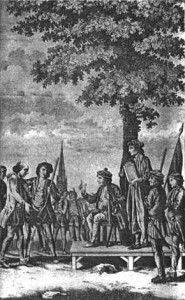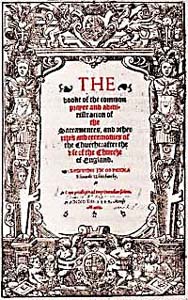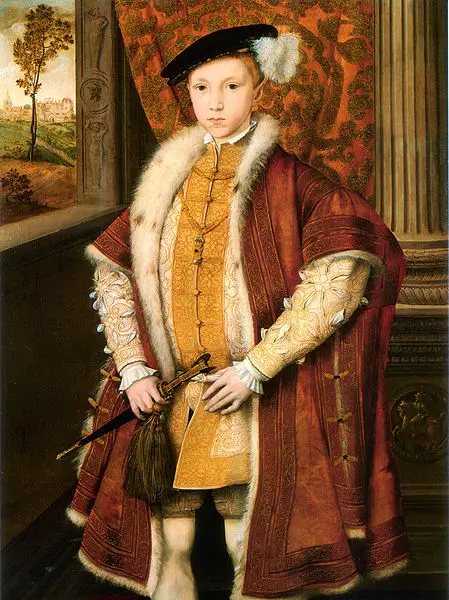
An 18th century engraving of Robert Kett and the rebels under the Oak of Reformation.
In the 1540s, more and more common land was being 'enclosed', i.e. fenced off, by local landowners for grazing for their sheep. This meant that villagers and small farmers didn't have as much land to graze their own sheep and many faced real hardship. Edward Seymour, Lord Protector, was concerned about the greed of landowners and the impact it was having on smaller farmers and so set up an enclosure commission to investigate and report illegal enclosures of common land. Only one commission actually went ahead but Somerset's measures were enough to make the common people believe that the government was on their side and they started tearing down the hedges and fences that enclosed the common land.
In Norfolk, Robert Kett, a landowner from Wymondham who had enclosed local common land for his own use, listened to the rebels who came on to his land and was moved by their plight. So moved was he that he helped them remove the fences and hedges and decided to become their spokesman and leader. He led them to Norwich, picking up more rebels on the way. By the time they set up camp at Mousehold Heath, near Norwich, it is said that they numbered around 16,000. They drew up a list of 29 demands/grievances and sent them to Protector Somerset - these can be read for free on Google books in Kett's Rebellion in Norfolk: Being a History of the Great Civil Commotion that Occurred at the Time of the Reformation, in the Reign of Edward VI. Founded on the "Commoyson in Norfolk, 1549"..., p48-56. On 21st July, the rebels received an answer from the King's Council. The message declared them rebels and offered them a pardon, which they rejected.
On 22 July, the rebels attacked Norwich and took the city. Once in the city, they set up their own local government and began trying cases brought against landowners by commoners. Landowners who were found guilty of enclosing common land illegally were imprisoned. Some of these cases were heard under the Oak of Reformation, an oak tree on Mousehold Heath.
The Marquis of Northampton was sent to win back Norwich from the rebels, but was defeated by the rebel forces. John Dudley, Earl of Warwick, was then sent with a large army. On 26th August, Warwick received 1,000 mercenaries as reinforcements to fight the rebels and on 27th August the Battle of Dussindale took place. The mercenaries John Dudley, Earl of Warwick, had received the day before forced Kett and his rebels to move from Mousehold to the valley of Dussindale by cutting off their supply lines. It was in this valley – the actual location is not known – that a bloody battle took place. There were heavy losses on both sides, with reports ranging from 1,000 to 10,000 rebels being killed. Warwick was victorious, and the rebellion was over.
Robert Kett fled the battle scene, but was captured the following day at the nearby village of Swannington. He and his brother, William, were imprisoned in the Tower of London and then tried for treason. They were both found guilty and were hanged on 7th December 1549; Robert at Norwich Castle and William at Wymondham Abbey.
On 28th August 1549, rebels who had been captured during the battle were hanged at the Oak of Reformation, the tree where the rebels had previously gathered for prayer, and outside the Magdalen Gate, Norwich.
As history teachers Mr Worn and Miss Cust point out to students on their blog Tudor Rebellions, Kett's Rebellion was not just caused by illegal enclosure of common land. Other causes included bad local government and religion. Miss Cust writes: "7 articles in Kett’s manifesto contain more protestant demands – that priests should preach and teach more, that priests live with aristocrats rather than with their flocks, and that they are grasping over tithes. They demanded that parishioners should choose new priests if their existing priest was not good enough."
Sources and Further Reading
- Tudor Rebellions: Kett's Rebellion 1549
- Kett Rebellion, Spartacus Educational.
- Kett's Rebellion, David Ross, Britain Express.
- Kett's Rebellion in Norfolk: Being a History of the Great Civil Commotion that Occurred at the Time of the Reformation, in the Reign of Edward VI. Founded on the "Commoyson in Norfolk, 1549"...
- The 1549 Rebellions and the Making of Early Modern England, Andy Wood.



Leave a Reply